|
|
|
Sort Order |
|
|
|
Items / Page
|
|
|
|
|
|
|
| Srl | Item |
| 1 |
ID:
193110
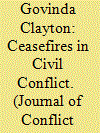

|
|
|
|
|
| Summary/Abstract |
Ceasefires are arrangements through which conflict parties commit to stop fighting. They are a common part of intra-state conflict. Existing research on intra-state ceasefires is largely limited to case studies and guidance notes for the policy and practice community. What has to date been lacking is a complementing body of comparative quantitative analysis to identify broader ceasefire trends and test the wider applicability of theory. Recent advancements in ceasefire data offer new opportunities to broaden the research agenda on ceasefires. This special section sets out the current state of the art in ceasefire research and provides the intellectual foundations to advance a new sub-field of quantitative ceasefire research. We discuss the conceptual challenges facing the study of ceasefires, offer a brief overview of ceasefire research focusing on the functions, timing, and sustainability of arrangements, and discuss the collective contributions of the articles included within this special section, and the implications for research and practice.
|
|
|
|
|
|
|
|
|
|
|
|
|
|
|
|
| 2 |
ID:
193111
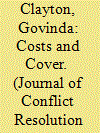

|
|
|
|
|
| Summary/Abstract |
Ceasefires are common in civil conflict. Yet we have surprisingly little comparative analysis of why and under what conditions they occur. A ceasefire provides temporary relief from the costs of conflict, but also generates its own costs. Building on this logic, we argue that conflict parties are more likely to accept the costs associated with a ceasefire when the conflict costs are greater, in particular, when: violence is intense; there are higher levels of ‘collateral damage’; and the parties lack international support. Second, we contend that ceasefires are also more likely in those periods in which the audience costs associated with entering into an arrangement are lower, specifically, when the parties have some form of ‘political cover’, such as during mediation. We find support for both arguments in an analysis of a new dataset capturing all ceasefire in civil conflict from 1989-2020, using a series of dyad fixed effect models.
|
|
|
|
|
|
|
|
|
|
|
|
|
|
|
|
| 3 |
ID:
193123


|
|
|
|
|
| Summary/Abstract |
Does democracy heighten or lessen the incidence of terrorism? This question has eluded a definitive answer for over three decades. Some terrorism researchers find that democracy has dampened terrorism; others that democracy has encouraged it; still others that there is a curvilinear or more nuanced relationship between the two. In this article, we contend that democracy has differential effects on terrorism, depending on the goals of particular terrorist groups. We claim that efforts to restrict democracy, by decreasing political rights and civil liberties, will effectively constrain terrorist activity from “strategic” groups but will have the opposite effect on “universalist” groups. The reason for this variance, we argue, involves the scope of ambition and underlying motivation distinguishing these very different types of terrorist movements. Because universalist groups have abstract ambitions and non-negotiable goals, they are unlikely to be deterred by crackdowns on democracy. Alternatively, because strategic groups do not see their missions as all-or-nothing campaigns of good versus evil and instead seek limited and concrete goals, anti-democratic measures are more likely to succeed against them. Our analysis of 200 countries from 1972 to 2016 finds strong support for this claim.
|
|
|
|
|
|
|
|
|
|
|
|
|
|
|
|
| 4 |
ID:
193120
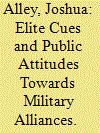

|
|
|
|
|
| Summary/Abstract |
Do elite cues exert extensive, conditional or minimal influence on public support for military alliances in the United States? I assess the boundaries of elite leadership on public opinion towards alliances by dividing partisan respondents into wings based on isolationism and militant assertiveness. If co-partisan elite cues change public attitudes across three or four wings within their party, elites exert extensive influence. Elite cues exert conditional influence if they reach two party wings, and minimal influence if they impact one or no wings. Using two conjoint survey experiments to examine public attitudes towards forming and maintaining international alliances, I find that elite cues exert extensive influence, but some individuals hold rigid alliance attitudes. Staunch alliance supporters in the Democratic party and consistent alliance skeptics in the Republican party both discount elite cues. Therefore, elites can lead most party wings with alliance cues, but intra-party divisions can constrain their influence.
|
|
|
|
|
|
|
|
|
|
|
|
|
|
|
|
| 5 |
ID:
193117
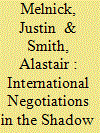

|
|
|
|
|
| Summary/Abstract |
Within a formal model of international agreements in the shadow of renegotiations and domestic competition, we highlight three important ways elections shape international agreements. Elections determine who will be in control of policy in the future, which affects how leaders bargain today. Elections also determine the deals policymakers will agree to. Finally, proposers have the opportunity to shape the contours of domestic political competition with what is offered in pre-electoral bargaining. We identify that several canonical results in the literature – like the Schelling conjecture or the idea that hawkish leaders have an innate bargaining advantage over dovish leaders – only hold under certain restrictions on how voters evaluate their leaders. In contrast, we show paradoxically that when voters are prospective, electoral incentives shade the ability for domestic leaders to negotiate better deals for their publics. Counterintuitively, this leads to hawks agreeing to more conciliatory agreements than doves.
|
|
|
|
|
|
|
|
|
|
|
|
|
|
|
|
| 6 |
ID:
193116


|
|
|
|
|
| Summary/Abstract |
This article introduces the Civil Conflict CeaseFire (CF) dataset. The CF data covers all ceasefires in civil conflict between 1989 and 2020, including multilateral, bilateral and unilateral arrangements, ranging from verbal arrangements to detailed written agreements. In total, the CF data includes 2202 ceasefires across 66 countries and 109 civil conflicts. The data feature information on the actors involved in the ceasefire, and the class, purpose, coverage, and end date of the ceasefire. The CF data provide an empirical basis to assess the conditions that give rise to ceasefires, how ceasefires affect the dynamics of conflict, and the role of a ceasefire in the peace process. This article presents the rationale underlying the data collection, the coding rules and procedures, and how this data can be used for analysis.
|
|
|
|
|
|
|
|
|
|
|
|
|
|
|
|
| 7 |
ID:
193113
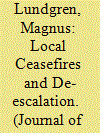

|
|
|
|
|
| Summary/Abstract |
Local ceasefire agreements are prevalent in modern civil wars, but we know little about their impact. This study analyzes geo-referenced data on 145 local ceasefire agreements declared during the Syrian Civil War, 2011-2019, exploring their short- and long-term effects on the intensity of armed violence. Drawing on scholarship on gradual confidence-building processes, we theorize the conditions under which local ceasefire agreements may generate trust and reduce conflict intensity. Using interrupted time-series analysis and spatial panel regression, we examine factors relating to the design and strategic context of ceasefire agreements. We find that local ceasefire agreements can trigger both escalation and de-escalation in the short term. De-escalatory outcomes are more likely in the long-term, when ceasefire signatories share a history of previous interaction, and when ceasefires are implemented in a stepwise fashion. We also find evidence of spatial diffusion: local ceasefire agreements in one area reduce conflict intensity in neighboring areas.
|
|
|
|
|
|
|
|
|
|
|
|
|
|
|
|
| 8 |
ID:
193119


|
|
|
|
|
| Summary/Abstract |
Research on public opinion and foreign policy in China has focused on nationalism as the driver behind public support for the use of force. However, nationalism is just one of many potentially significant factors that can increase support for military deployments. In this article we build a mediation model to test the relative effects of psychological predispositions, foreign policy attitudes, perceptions of the opposing state and calculations about the likely outcome of the conflict on support for China sending naval forces to the disputed Diaoyu/Senkaku Islands. We find that dislike of the Japanese government and a belief that China would be victorious in a conflict with Japan are both powerful predictors of support for the use of force. Nationalism and militarism directly increase support but also indirectly increase it via different pathways. Nationalists are more confident in a Chinese victory while militarists have a stronger dislike of the Japanese government.
|
|
|
|
|
|
|
|
|
|
|
|
|
|
|
|
| 9 |
ID:
193114
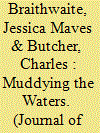

|
|
|
|
|
| Summary/Abstract |
Ceasefires are a critical tool for those engaged in conflict management during civil wars, yet little scholarship exists that systematically assesses the durability of these arrangements. We argue that ceasefire failure is driven by variations in the composition of organized dissent including and beyond the context of the civil war. In particular, ceasefires should break down faster given increasingly complicated environments of broader anti-government dissent, where resistance dynamics alter the perceived or actual balance of power between rebels and the state. Using original data on organizations participating in violent and nonviolent dissent across African states from 1990-2015, and new data on civil war ceasefires, we find that ceasefire breakdown is precipitated by complex resistance environments that put the government in a precarious position. Increasing numbers of mobilized organizations, higher ideological fractionalization among those groups, more dense and increasingly decentralized dissident networks all expedite the failure of ceasefires in civil wars.
|
|
|
|
|
|
|
|
|
|
|
|
|
|
|
|
| 10 |
ID:
193115
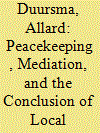

|
|
|
|
|
| Summary/Abstract |
This article theorizes on how military and civilian components of peacekeeping operations contribute to the conclusion of local ceasefires in non-state conflicts involving armed opposition groups or communal groups. A mediation-based logic suggests that civilian peacekeeping staff can provide technical support aimed at resolving the conflict issues and engage with state officials to promote peace. A capabilities-based logic suggest that military peacekeepers can provide security during the negotiations, arrange logistics, and put military pressure on the conflict parties, which all should make the conclusion of a ceasefire more likely. The analysis supports both the capabilities-based and the mediation-based logic. An instrumental variable estimation helps to account for endogeneity. This article contributes to the literature on peacekeeping, mediation, and ceasefires through shifting the focus to non-state conflicts.
|
|
|
|
|
|
|
|
|
|
|
|
|
|
|
|
| 11 |
ID:
193121


|
|
|
|
|
| Summary/Abstract |
How does political imprisonment influence anti-regime protest? We argue that political imprisonment facilitates rather than stifles protest. Political imprisonment is a salient indicator of arbitrary rule creating ‘embodied grievances’. It enables the formation of dissident networks within prisons, and serves as a legitimating credential for former inmates to lead resistance. These mechanisms imply that political imprisonment is a self-defeating strategy, making it easier for the opposition to overcome their collective action problem. We test our argument with subnational data from the German Democratic Republic between 1984 and 1989. To account for endogenous latent dissent, we use originally collected archival data on local surveillance operations. Exploiting daily variation in the timing of protests in 1989, we analyze the long-term impact of political imprisonment on mobilization. Results from survival analyses lend support to our hypothesized relationship. Combined with semi-structured interviews to probe our mechanisms, our findings suggest that political imprisonment increases the likelihood of protest mobilization.
|
|
|
|
|
|
|
|
|
|
|
|
|
|
|
|
| 12 |
ID:
193122


|
|
|
|
|
| Summary/Abstract |
Conflict points around the world involve government forces fighting terrorist groups. In this type of warfare, there is a danger that counterterrorist efforts may backfire, providing ammunition for additional cycles of violence. We study this issue focusing on selective and indiscriminate house demolitions employed by Israel during the Second Intifada. We exploit the temporal and spatial variation of this policy to assess its impact on Palestinians’ political views. We find that the civilian population does not react to punitive house demolitions, a selective form of counterterrorism. On the contrary, Palestinians are more likely to adopt more radical political opinions in response to precautionary house demolitions, an indiscriminate form of counterterrorism. We also show that political radicalization induced by indiscriminate counterterrorism leads to an increase in future terror attacks. Overall, our analysis provides explicit empirical support to the mechanism behind the positive correlation between indiscriminate counterterrorism and future levels of violence.
|
|
|
|
|
|
|
|
|
|
|
|
|
|
|
|
| 13 |
ID:
193118


|
|
|
|
|
| Summary/Abstract |
A number of studies on sanction effectiveness have highlighted the importance of regime type and how it affects the sensitivity of sanctioned states (target) to the economic costs of sanctions. The scholarly consensus holds that mainly because of their responsiveness to domestic audiences, democratic regimes are most likely to give in to the demands of the sanctioning state (sender). I argue that regime type is important not only in influencing leaders’ sensitivity to economic costs—which create incentives to back down—but also to the audience costs—which create incentives to stand firm. I argue that taking the audience cost into account would lead to different predictions about the effect of democracy. Particularly, I argue that the effect of democracy is inverted- U shaped, where full democracies have no higher likelihood of meeting the demands of the sender than mixed (hybrid) regimes. Using a newly released dataset on economic sanctions between 1950-2020, I find robust support for my argument.
|
|
|
|
|
|
|
|
|
|
|
|
|
|
|
|
| 14 |
ID:
193112
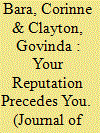

|
|
|
|
|
| Summary/Abstract |
How does the state’s behavior in negotiations with one non-state group influence the behavior of other non-state actors? We argue that the dynamics of different conflicts within the same country are interdependent, and that a state develops a reputation through its interactions with each conflict party. This reputation provides a valuable source of information that other groups use to judge the state’s cooperative intentions. When a state develops a reputation for cooperation, this increases the likelihood of (indirect) reciprocation from other groups. More specifically, we argue that when states enter into (and honor) a ceasefire with one rebel group, they demonstrate a credible reputation for cooperation. A credible reputation for cooperation, we posit, increases the likelihood that other conflict parties enter into ceasefires with the state, or that they de-escalate their military activities. We test our claims using the new civil conflict ceasefire dataset and find support for our argument.
|
|
|
|
|
|
|
|
|
|
|
|
|
|
|
|
|
|
|
|
|